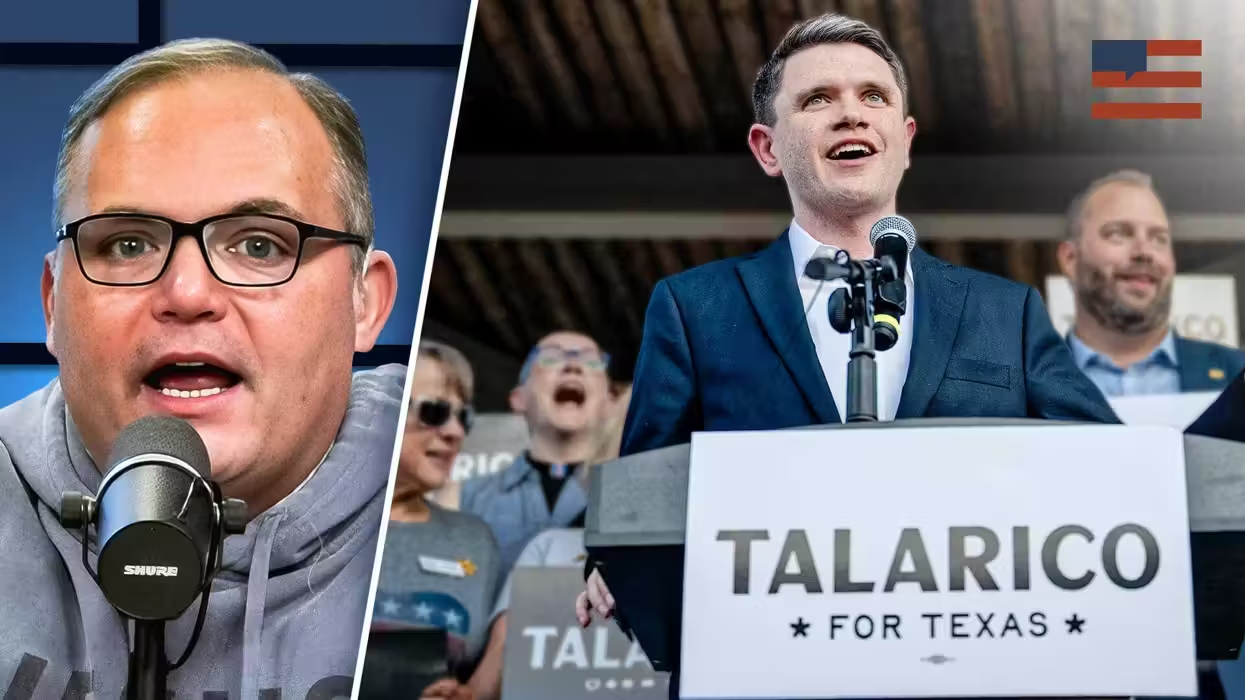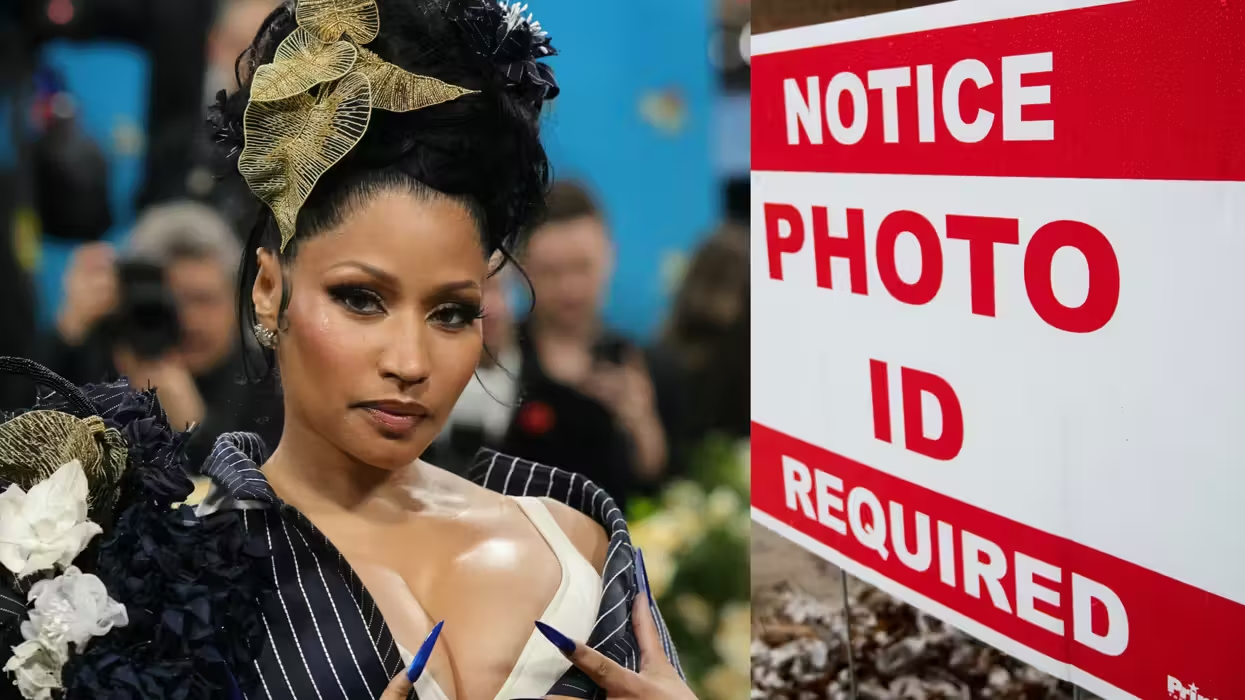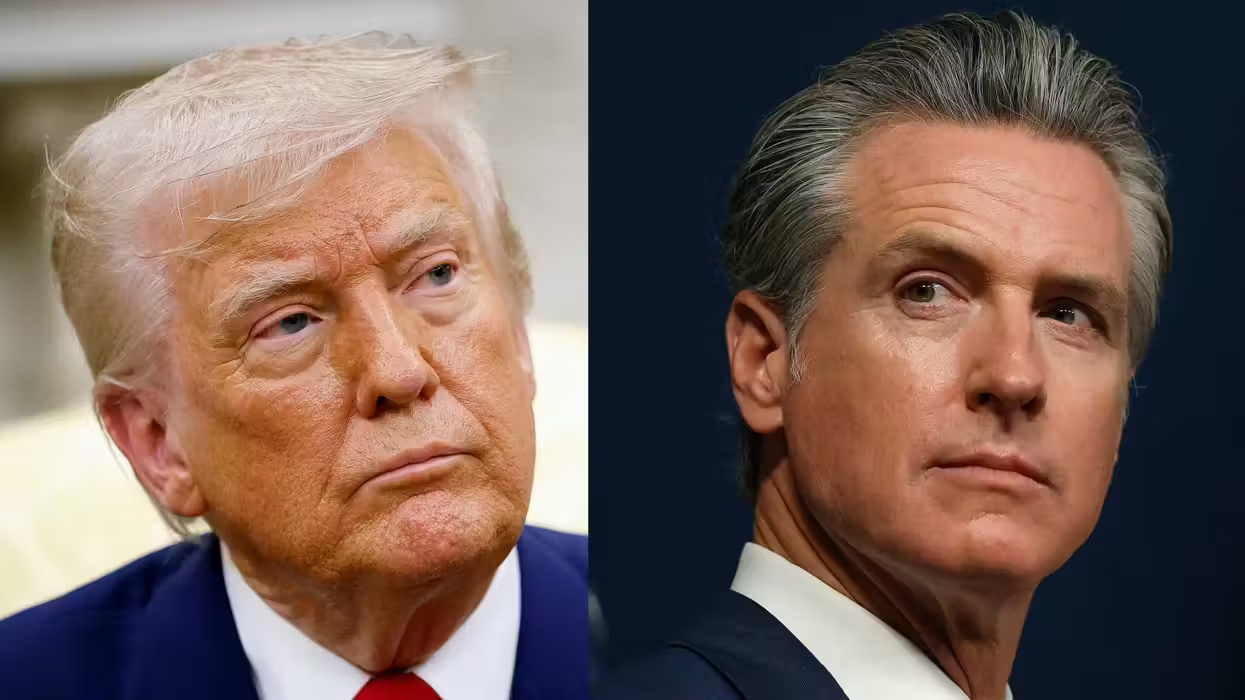
© 2026 Blaze Media LLC. All rights reserved.
An interview with Paul Kengor, Reagan biographer and author of 11 Principles of a Reagan Conservative
March 04, 2014
'This is a crucial period of retrenchment, refinement, renewal for conservatives. It’s time to get back to basics and remember what we believe and why. I wrote this book to help that process. And who better to help us in that process than Ronald Reagan, the very embodiment of conservatism?'
 Paul Kengor teaches political science at Grove City (Pa.) College.
Paul Kengor teaches political science at Grove City (Pa.) College.
In connection with the release of his new book, "11 Principles of a Reagan Conservative," reviewed here, we interviewed Paul Kengor, professor of political science at Grove City College, Reagan biographer, and author of numerous books including the 2012 title ”The Communist” (published under our Mercury Ink imprint) and “God and Ronald Reagan: A Spiritual Life.”
Our correspondence with Professor Kengor comes in light of a renewed focus on Russia given the goings-on in the Ukraine, years of economic stagnation and hostile in-fighting between conservatives and Establishment Republicans, among other similarities with the era in which Reagan rose to the White House.
Below we cover these timely issues and more. The interview, conducted via email, has been slightly edited for formatting. And again, be sure to check out our review and cheat sheet if you missed them too.
Give us your elevator pitch for why TheBlaze audience should read another book on Reagan.
Kengor: Because this is a book on Reagan that’s crucial and timely and well worth their time—and it’s short. They will sincerely find great benefit in this one. I mean that.
We constantly hear Republicans of all stripes make the claim “I’m a Reagan conservative,” or, when asked which Republican they most identify with, they point to Reagan. But in fact, many to most are not Reagan conservatives at all. Many of them are liberal/progressive Republicans. So, what is a “Reagan conservative?”
I’m someone who has studied Reagan enough (some say more than anyone) that I felt I could and should and must take up the task of answering that question, especially during this battle within the GOP between genuine conservatives like Ted Cruz, Mike Lee, Rand Paul, Tom Coburn and what Reagan would have called the “Rockefeller Republican” types. There are far more Reagan conservatives coming out of the Tea Party than from the so-called Establishment.
Thus, with the 2014 mid-terms coming up, and the crucial 2016 presidential nomination coming as well, this project to define what a Reagan conservative is struck me as imperative. I should add, too, that Reagan was such a model conservative, really the prototype, that this book defines not just Reagan conservatism but conservatism generally.
When I spoke on this book at the Reagan Ranch Center in Santa Barbara last week, the executive director of the group, Andrew Coffin, said that this book is a kind of manifesto on conservatism.
So, I ask readers of The Blaze: What could be more needed right now as we engage in this battle for 2016? I think a short book carefully explaining Reagan conservatism and conservatism generally is one they should read.
Besides, because it’s a short book, it’s also very inexpensive—only something like $13 on Amazon. You can’t beat that. It’s cheap and quick but an enlightening read. You’ll benefit from this and will want to buy it for your friends, including your liberal friends.
A short book is an unusual one for you.
[instory-book ISBN="9780825306990"]
Kengor: Yes, it is. My previous book, "The Communist: Frank Marshall Davis, The Untold Story of Barack Obama’s Mentor," which I did for Mercury Ink and which we talked about a lot here at The Blaze, was almost 400 pages. The one before that, "Dupes: How America’s Adversaries Have Manipulated Progressives for a Century," was over 600 pages. And my prior four or five Reagan books were all 300-plus pages.
This book is only 157 pages, over half of which are the texts of four great Reagan speeches that every student of Reagan and every conservative should read. I also include a copy of the actual original draft of the Evil Empire speech, which was a terrific speech that was about much more than the Soviet Union. I’ve had a copy for 13 years, since I first touched the original at the Reagan Library at the summer of 2001. I was blown away by it, as readers of TheBlaze will be as well. Reagan’s hand is all over it. It was a great speech written by Reagan’s chief speechwriter, Tony Dolan. But as Dolan himself will tell you, and as the draft makes clear, Reagan was at least the co-author of that speech. That speech is totally Reagan.
I’m very appreciative of the good folks at the Reagan Library for giving me permission to reprint that speech. They know how important it is for the wider public to see that draft. When you see that draft, you’ll think of how utterly idiotic it was that liberals in the 1980s claimed that Reagan was a stupid fool who had no hand in anything of any significance going on in his presidency.
What do you most hope that readers take away from your book?
Kengor: I want Republicans and conservatives to understand the difference between conservatism, libertarianism, and progressivism. As to progressivism, when readers of TheBlaze look at my 11 principles of Reagan conservatism, they will immediately recognize those principles as not just Reagan principles but the very antithesis of progressive “principles,” assuming we can really ever define progressive principles. (I won’t get into that here.) I want Republicans and conservatives to also have a clear set of guidelines on how and where a conservative Republican is different from a liberal or progressive one, on how a Ted Cruz stands in such stark contrast to a John McCain.
Also, I sincerely hope and wish that liberals/progressives will give this book a read. Their understanding of conservatism has long been a crude caricature, a cartoonish view that paints us as uncaring Neanderthals who merely want to deny people their government goodies and whatever new “rights” progressives of the day are pushing. Our conservative ideology is far more thoughtful than they realize. It is rooted above all in what Reagan and other leading conservative thinkers from Edmund Burke to Russell Kirk to William F. Buckley Jr. called “time-tested” ideals and values. We don’t simply go along with whatever new idea the cultural bandwagon happens to be peddling.
Liberals champion themselves as “open-minded” and apostles of “tolerance” and “diversity.” They pride themselves in being thoughtful, intellectual, educated, well-read. If that’s truly the case, then they surely ought to be able to sit down for a few hours and at long last consider a succinct explication of what conservatives really believe. It will be an eye-opening experience. It’s much less easy to demonize the other side once you open your mind and consider what the other side really has to say.
What compelled you to write this book at this time?
Kengor: I came to understand the imperative, as I noted above. But the genesis was accidental. We were doing a conference on conservatism at Grove City College, hosted by the Center for Vision & Values at Grove City College. I was told that I, being “The Reagan Guy,” needed to do a paper and presentation on “Reagan conservatism.” At first I balked, “Ah, I always do Reagan. I’d like to do something different for a change.” I thought maybe I’d do something on a great convert to conservatism, like Whittaker Chambers or James Burnham, or—here’s a good one—maybe a paper on where George W. Bush was and wasn’t a conservative. I liked that idea. But I realized that a paper on “What is a Reagan conservative?” really was a worthwhile and extraordinarily timely topic.
I did that presentation and then was asked to give it again and again. I found myself giving the talk at CPAC’s annual conference in 2012—which, incidentally, meets again this week. Our big roll-out for this book is at CPAC this week. Ronald Reagan himself spoke at CPAC 13 times from its founding in 1974 through the end of his presidency. Reagan never missed a CPAC during his eight years as president.
When I gave the talk at CPAC in 2012, people responded extremely favorably, suggesting I add another principle or two. (The book lays out 11 principles of Reagan conservatism.) I got invitations to give the speech elsewhere, including at the huge New Jersey Reagan Day Dinner in Parsippany, New Jersey. A number of people there, including Kimberly Begg of Young America’s Foundation, which hosted me for that speech, suggested I turn this into a short, concise book. They likewise understood how badly this book was needed. So, that’s eventually what happened.
You talk at length in your book about the indelible link between Reagan’s faith and freedom. Can you expand on this?
Kengor: This is an important question that particularly defines the differences between conservatives and libertarians.
Conservatives constantly talk of freedom. Go to any gathering of conservatives, and you hear a freedom mantra: freedom, freedom, freedom. They speak of “freedom” almost as if it were a one-word synonym for conservatism. Reagan also constantly spoke of freedom, and how every generation must fight anew to preserve it.
[sharequote align="center"]Freedom not rooted in faith can lead to moral anarchy, which...creates social and cultural chaos.[/sharequote]
Yet, as Reagan understood, to invoke freedom alone is a mistake. Freedom by itself, isolated, alone, is libertarianism, not conservatism. For the conservative, freedom requires faith; it should never be decoupled from faith. As I say in the book, freedom not rooted in faith can lead to moral anarchy, which, in turn, creates social and cultural chaos. Freedom without faith is the Las Vegas Strip, not the City of God.
Genuine freedom—and certainly the Christian conception of freedom—is not license. As noted by Pope John Paul II, with whom Reagan had an excellent relationship, without the rock and rudder of faith, freedom can become confused, perverse, and can even lead to the destruction of freedom for others. John Paul II’s successor, Pope Benedict XVI, said that the West suffers from a “confused ideology of freedom,” one that has unleashed a modern “dictatorship of relativism.” It truly does. America does.
In the New Testament, Galatians 5:13-14 states: “For you were called for freedom, brothers. But do not use your freedom as opportunities for the flesh; rather, serve one another through love. For the whole law is fulfilled in one statement, namely, ‘You shall love your neighbor as yourself.’”
Freedom needs faith. The conservative understands that. Reagan understood that. A true Reagan conservative will understand that.
What is the most surprising aspect of Reagan that you came across in researching the book, or the aspect of the book that you think will most surprise readers?
Kengor: I wasn’t surprised by much in this book, but I think liberal and progressive readers—again, assuming they open their minds and read this book—will be extremely surprised (shocked, actually) at just how thoughtful Ronald Reagan was. They’ll wonder how they ever missed all of this. And to that, I would answer that they must read more than just their New York Times and Huffington Post. They need to add a regular group of conservative sources to their reading routine. When they don’t, that’s when they so easily slip into caricature of us, our side, and of leading conservatives like Reagan.
[sharequote align="center"]liberal and progressive readers...will be extremely surprised...at just how thoughtful...Reagan was[/sharequote]
I read their sources all the time. Why can’t they bring themselves to read ours? When they do, they’ll be quite surprised. This book—i.e., Reagan’s thoughts—will be quite a surprise to them.
In light of the goings-on in the Ukraine (knowing that you get this question all the time), what do you think Reagan would say, and how would he act?
Kengor: One of the 11 principles in this book is anti-communism. Reagan dedicated his long life to undermining communism, particularly Soviet communism. Reagan said that nothing was more anti-freedom than pure communism. Vladimir Putin is an old KGB guy. Nothing that a KGB guy would do would ever surprise Ronald Reagan.
I could say much more, but in the interest of brevity I’ll stress this one thing that Reagan would indeed “say,” as you asked. The operative word is “say.” Despite liberals framing Reagan as a reckless cowboy, he rarely used force. He never sent troops into Poland while the Soviets were threatening Poland and (as we now know) even moved troops near the Polish border. Rather than deploying troops or firing missiles, Reagan fired verbal missiles—words as weapons. He used the presidency as a moral pulpit to encourage those “captive peoples” who were being suppressed by Russia and the communist world. His public and very vocal and encouraging voice of support for people under the Russian or communist jackboot was literally constant. It was very important to those people, as anyone from the former communist world will fondly tell you today. They adore Reagan. It’s no coincidence that today they build statues to Reagan in Poland and elsewhere in the former Communist Bloc.
[sharequote align="center"]Reagan would unhesitatingly make himself a voice for the oppressed in the Ukraine right now.[/sharequote]
Reagan would unhesitatingly make himself a voice for the oppressed in the Ukraine right now.
Is there any one speech or statement that best encompasses Reagan’s conservatism, in your view?
Kengor: In the speeches section of the book, I include a gem that Reagan gave at CPAC 27 years ago right now. In fact, I’ve just written an [op-ed on that speech for The Blaze’s editorial section]. I won’t quote it here, but Reagan was facing a Republican establishment dominated by Gerald Ford and the liberal Rockefeller wing. It was a battle for the heart and soul of the GOP as 1980 approached. Conservatives were being pushed away by the GOP establishment, frowned upon and snickered at. The Democrats had the White House and were wreaking havoc on the country, the economy, and foreign policy. Things were looking very bleak for conservatives. And so, in this speech, Ronald Reagan laid a “principled politics” and “politics of principles,” a conservative vision that he believed could be taken into a renewed and revitalized Republican Party and that could win back the White House in 1980 and change the country.
Do I need to say that the rest is history?
It’s a speech of extraordinary relevance to the political situation right now. What Reagan was thinking at CPAC in 1977 should be exactly what Republicans should be thinking in 2014.
Is there a best little-known speech to which you would direct our readers?
Kengor: Absolutely. It’s Reagan’s October 1988 speech at Georgetown University, for the occasion of its bicentennial. I’ve had my students read it for years. Now, with this book, a wider audience can read it. It’s in the speeches section.
In that speech, Reagan underscores the interdependent relationship between faith and freedom—and, for that matter, learning. Reagan believed that learning was about learning this reinforcing relationship between faith and freedom. A genuine education, Reagan believed, was about being educated on the vital importance of both faith and freedom in America. Needless to say, our youth today are not learning about this relationship. They haven’t learned about it in decades. Those youth of the past who were ignorant of that relationship are now adults today—voting adults.
[sharequote align="center"]A genuine education, Reagan believed, was about being educated on...faith and freedom[/sharequote]
This ignorance of this crucial fundamental helps explain the mess we’re in as a country and a culture.
Can you speak a little bit to Reagan's aversion to nuclear weapons?
Kengor: He was a nuclear abolitionist. He detested nuclear weapons to the point that he was actually willing to completely abolition them—if he could get the Soviets to agree.
And what did the liberals say about Ronald Reagan in the 1980s? They said that he loved nuclear weapons, adored them, slept with them. They portrayed him as a trigger-happy nuclear warmonger itching to launch Armageddon. It was awful. Yet again, they didn’t pause to actually read Reagan’s words and understand him. It was pure caricature—cartoonish, buffoonish, mean-spirited caricature.
You speak to the stark contrast between Barack Obama’s adherence to the notion of collective action and Reagan’s belief in the individual. Would you care to elaborate on this point?
Kengor: This is a good point to conclude. I think this is extremely significant. I lay this out in the final principle that I cover in the book.
Reagan had the highest respect for the individual, whether the person wallowing in the Gulag, the person growing in the womb, the person paying taxes, the person caught on the treadmill of welfare-state dependency, the entrepreneur who starts a business and creates jobs and generates prosperity. Reagan was confident in the individual’s ability to make a difference, to pick up himself or herself, to make and mirror America’s exceptionalism. He constantly extolled the individual.
Obama, on the other hand, constantly extolls what he calls “collective action.” The word “collective” appears frequently in Obama’s rhetoric, including in his memoirs, "Dreams from My Father." Obama once told an interviewer: “In America we have this strong bias toward individual action. You know, we idolize the John Wayne hero who comes in to correct things with both guns blazing. But individual actions, individual dreams, are not sufficient. We must unite in collective action, build collective institutions and organizations.”
This Obama quotation is the anti-Reagan, right down to its dismissal of the “John Wayne hero.” Reagan believed in the John Wayne hero—in fact, Reagan knew John Wayne well, and John Wayne as a big Reagan political supporter.
Already, since this book went into print, Obama used yet another manifestation of the “collective” term. In his State of the Union speech, he spoke of our “collective shoulder.” He wistfully envisioned the American masses placing their “collective shoulder on the wheel of progress.”
[sharequote align="center"]Obama, in his beliefs, his actions, his choices, and above all his ideology, is...the anti-Reagan[/sharequote]
Barack Obama, in his beliefs, his actions, his choices, and above all his ideology, is really the anti-Reagan and the anti-Reagan conservative. That, too, is something that readers will unmistakably take away from this book, even when it isn’t explicitly pointed out.
This is a crucial period of retrenchment, refinement, renewal for conservatives. It’s time to get back to basics and remember what we believe and why. I wrote this book to help that process. And who better to help us in that process than Ronald Reagan, the very embodiment of conservatism?
Want to leave a tip?
We answer to you. Help keep our content free of advertisers and big tech censorship by leaving a tip today.
Want to join the conversation?
Already a subscriber?
Ben Weingarten is a writer, commentator, and editor at large at RealClearInvestigations. He is a senior contributor at the Federalist and writes columns for Newsweek and the Epoch Times.
Ben Weingarten
Ben Weingarten is a writer, commentator, and editor at large at RealClearInvestigations. He is a senior contributor at the Federalist and writes columns for Newsweek and the Epoch Times.
more stories
Sign up for the Blaze newsletter
By signing up, you agree to our Privacy Policy and Terms of Use, and agree to receive content that may sometimes include advertisements. You may opt out at any time.
Related Content
© 2026 Blaze Media LLC. All rights reserved.
Get the stories that matter most delivered directly to your inbox.
By signing up, you agree to our Privacy Policy and Terms of Use, and agree to receive content that may sometimes include advertisements. You may opt out at any time.






